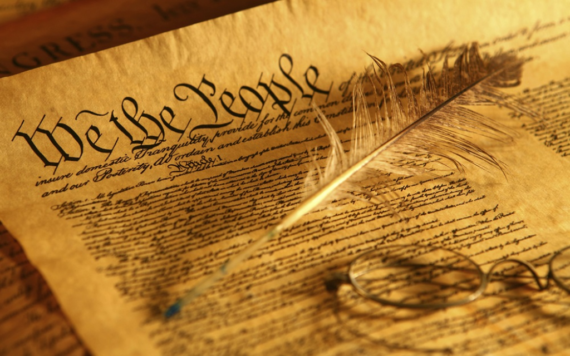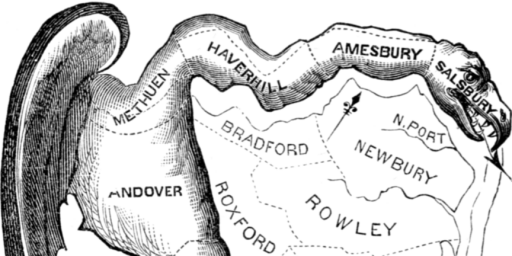A Reminder that Institutions Matter
Some key numbers.

James Joyner’s post on the Electoral College reminds me of some numbers that really need to be front and center as clear illustrations of how the rules we use to elect the president are problematic (to put it more kindly than I did in the comments of that post).
The first number is one out of five. One is the number of times (out of five attempts) that the Republican candidate for president has won the popular vote. However, out of those five electoral cycles, linked to five terms of office, the Republican has won three of five.
Specifically: George W. Bush won re-election in 2004 and it the only Republican President to have won the popular vote in this century. Yet, of the five terms of office that started in 2001, only two terms have been held by a Democrat. Indeed, the last Republican to win the popular vote prior to 2004 was George H. W. Bush in 1988.
So, from 1988 to 2016 we have had eight elections for president, with the Republicans winning the popular vote all of twice. Yet, there have been four Democratic terms and four Republicans terms. That is indicative of a flawed set of institutions.
Side note: only once during that entire span did a party have the votes needed across all branches to govern in an unobstructed manner. This was during a brief stretch of time in 2009 (it was only a handful of months during that one year that the Democrats had 60 votes in the Senate).
A second set of numbers: of the nine Justices on the Supreme Court, four (Roberts, Alito, Gorsuch, and Kavanaugh) were appointed by presidents who initially (or solely) came to power via a popular vote/electoral vote inversion.
While it is true that Roberts and Alito were appointed after Bush won the popular vote in 2004, it is still worth noting that without winning the EC by a hair in 2000 Bush almost certainly would not have run in 2004.
And, of course, there is the fact that the Senate, which is not representative of the country as a whole confirms the members to the Court. And, of course, such a set of observations must include McConnell’s maneuver to block Obama from making an appointment to replace Antonin Scalia.
Let’s further consider the way some of these numbers converge: since 2001 the majority of the Supreme Court has turned over: there have been six new Justices during that time period. Of those six, four appointees have been made by Republicans. The party that won the popular vote once from 2001-2016 has been able to appoint four out of six (67%) of the SCOTUS Justices during the same time frame. (And, also, three terms worth of lower court nominations).
One popular vote win has resulted in a multi-decade level of influence over the entire judiciary.
If we consider the whole of the current Court the relevant elections are 1988-2016 (eight cycles). Of those, Republicans won the popular vote twice (1988 and 2004) and Democrats won the popular vote six times (1992, 1996, 2000, 2008, 2012, and 2016). But, as already noted above, Republicans won the office four out of eight terms. During this period of time, Republicans have appointed five of the nine Justices, to include the Chief.
So, when mass publics are discontented with politics and political outcomes, I think that part of the reason, whether most people understand it or not, is because our institutions do such a poor job of representing us–and the well known, but worth reiterating, examples noted here are just some of the ways that they fail at their job. (And this does not even get into the major, and arguably even more serious, problems with legislative representation).
And to be clear: representative democracy is not about simple majority rule. I am not, nor have I ever, argued that the majority should have the right to do whatever it wants due to its majority status (democracy worthy of the name includes majority-based decision rules with built in minority protections of various kinds). But for those who want to go down the “we’re a republic and not a democracy” rabbit hole* because they think that rules that limit majority tyranny are what being a “republic” is all about, let me point out that what I have outline above is not minority protection.
It is minority rule.
Of the various things that are worse than simplistic majority rule is minority rule (especially in a system that claims to be democratic).
The system was not intended to create minority rule. Indeed, the most fundamental point of American republicanism was to do away with aristocracy–which was a form of minority rule.**
(Look, sure, if we want to be accurate, the US Constitution was originally created for minority rule in the sense that slaves and women could not vote. But for the white males that it counted as citizens, the assumption was that the system would function primarily on majority rule–Madison explicitly argues for what we now call representative democracy in numerous places in the Federalist Papers.)
To reiterate: the notion that a system that, on a mass level, provides more power to the minority than to the majority in terms of basic decision rules (like selecting a president) is inherently flawed. It is not democratic. And even if one tries to engage in some convoluted argument that tries to establish that the EC does some amazing magical representation that is superior to a popular vote, all one is doing is rationalizing a failed institution that never even worked as designed.
Any argument in favor of the Electoral College has to also explain why it is fair in any sense of the word for the minority of the population to have to not only selected the president as frequently as it has in recent years, but also to justify why the minority has had, by extension of those elections, so much influence over the courts.
*See here if one is unfamiliar with that rabbit hole: The “A Republic, not a Democracy” Library
**Article IV, Section 4 of the US Constitution states “The United States shall guarantee to every State in this Union a Republican Form of Government” as well as Article I, Section 9: “No Title of Nobility shall be granted by the United States.”






White makes right?
Slowly but surely you and James are both causing me to question my support for the Electoral College.
At this point, I think the only reason I’m dismissing the idea because accomplishing it would require a Constitutional Amendment and we all know how unlikely that is.
(And yes I am aware of the National Popular Vote initiative but I am skeptical about ideas that seem like an end-run around the law. I also think that the initiative would need Congressional approval as an Interstate Compact pursuant to Article I, Section 10)
I wonder how popular the idea of abolishing the EC is among Democrats. I assume it’s not at all popular with Republicans, and won’t be until one Democrat wins the EC while losing the popular vote.
@Doug Mataconis:
Progress! 😉
I would argue that those are separate issues (but I concur that change is harder, if not impossible). I just think that it needs to be talked about, and a lot, to get people to at least think past the assumptions that most of us were given in our youth.
And I am not sanguine about the NPV.
@Kathy:
This is the problem: it favors one party quite clearly, so getting that party to support change is quite difficult.
Perhaps it is a typo, but the President has always been elected by a minority of the population and often not even a majority of actual votes cast. For example, Donald Trump was elected by around 19% of the population (Clinton got around 20%). Many Presidents over the years got elected with less than 50% of votes cast, sometimes far below 50%.
So I think one has to be careful when making sweeping statements about majority and minority “rule.”
Also, it’s relevant to point out that the vote totals would be different under a different system. Saying that Gore or Clinton would have won the election because won the popular vote wrongly assumes the same result would have happened under a popular vote system. That’s not a safe assumption.
For example, if we had a popular vote system in 2000, we can’t say who would have won because that counterfactual would have resulted in a very different election dynamic, likely bringing very different results. The candidates would have campaigned very differently under a popular vote system and voter incentives and participation would have been far different as well. Declaring that the 2000 election resulted in “minority rule” wrongly assumes that an alternative election system would also have given Gore a plurality of the vote. But we don’t actually know who a popular vote system would have elected.
Again, when talking about majority/minority rule in relation to a single election, it depends.
So the problem with the EC is not “minority” rule per se, because what constitutes a minority, majority (or plurality) is not some consistent fact that is immune to the variables of different electoral systems. And that’s one of the reasons I think a popular vote system would be better – because it would change individual voter and citizen incentives in a positive direction and more accurately represent the actual majority of the American voting public (but still do so imperfectly) than our present system (even if we’re still stuck with two parties).
Rather, the problem with the EC is entirely one of perceived legitimacy. It’s the incongruence that is the problem.
And since you mentioned fairness in relation to the population, there are many other ways to look at the EC and see it at problematic.
Alternatively, one could argue that the EC is fairer with respect to the total US population because electors are allocated based on total population, not eligible voters. States with large percentages of ineligible voters (due to age, citizenship status and, in some states, felons) get an advantage in the EC because they get more electors per eligible voter.
By contrast, individual voter influence varies greatly by state based on voter turnout because the number of electors for each state is fixed regardless of how many people vote in each state. Voters in states with high voter turnout, therefore, have less influence.
Unsurprisingly, this isn’t new, as disparities between voter eligibility rates played an important role at the Constitutional Convention, but I’m sure I’m preaching to the choir on that score.
@Andy:
The decision rule in question (the Electoral College process) has delivered minority outcomes twice in five cycles.
I understand the broader point about participation, but you are basically changing the subject.
@Andy:
I made no assumptions along these lines. I simply noted outcomes.
I fully recognize that different rules create different behaviors.
In two elections in 16 years the second-most voted candidate was elected. That’s a recipe for dysfunction, regardless of what would have happened under a different election system.
@Steven L. Taylor:
No, I have to side with @Andy on this one. You raised the issue of “minority rule”. He (correctly) pointed out that it has always been true that a minority of the population has determined who will make the decisions and impose them on everyone. If that’s not the definition you had in mind for “minority rule”, I think he has the better claim that he is using those words correctly and literally. Which takes nothing away from your enumeration of issues, except to perhaps rob you of a particularly evocative phrase.
In most countries the number of votes that elect the Head of State or the majority party in Parliament is not larger than the minority. What Steven is pointing out is Presidents and a Senate that are actively opposed by the majority of the population. Trump not only was the second most voted candidate, he never had a positive approval rating.
@Andy: Much shorter Andy: “My side wins, so it’s all good.”
@DrDaveT: ” I think he has the better claim that he is using those words correctly and literally”
Which would be fine if this were simply a conversation about phraseology. But he is deliberately using this semantic quibble to handwave past the substantive point Steven is making. It’s debasing and avoiding the argument, and, as rhetorical games go, lacks even the wit necessary to make such distractions worthy by virtue of entertainment value.
@Steven L. Taylor:
Again, if you’re talking about “a minority of the population” (which is what you actually wrote in your post), then every election winner represents a minority of the population.
And neither Clinton or Gore got a majority of votes, they got pluralities. I’m simply pointing out that framing the problems with the EC (problems we agree on to some extent) in that way is not accurate, nor is using majority as a stand-in for plurality.
No, as DrDaveT noted, I’m responding to your arguments and word choice.
As I noted, I do agree there is a problem with legitimacy when the EC result does not elect the candidate who got the most votes.
Except you have consistently made a claim of minority rule:
Again, in 2000 and 2016 no candidate got a majority of the vote and neither party commands the allegiance of a majority of the population.
And again, I agree that a popular vote system would do a better job than the EC in terms of representation, but it’s neither appropriate nor accurate to cast EC popular vote pluralities as majorities, much less representative of a majority of the population.
@wr:
Another internet mind-reader.
No, you do not understand what I’m doing or why – you’re simply projecting.
Dr. Taylor and I have gone around on this topic many, many times – there’s nothing particularly new here for those who’ve been paying attention to our debates for the last several years. We agree on many things but fundamentally disagree on others. One of those things is how well the parties generally, and through the election process specifically, represent the actual interests of the American people. Your accusation of bad faith is not accurate.
@Andre Kenji de Sousa:
Missed this earlier – I think that’s a really good way of putting it that’s much more accurate than framing it in terms of minority/majority rule.
@Andy:
If that is the problem, then yes, I was sloppy with my language.
Another synonym for “plurality” is “simple majority”–I could me more plain, I will allow, but in context the most votes in a given contest is a majority (whether simple or absolute).
Let be clear: an electoral decision rule that allows the winner of the contest to be someone who received less support than another candidate is minority rule. (Regardless of the participation rate, unless participation is curtailed in some way–but that is a different issue).
Rule 1: X gets 51% of the vote, Y get 40%, Q gets 9%: X wins by absolute majority.
Rule 2: X gets 51% of the vote, Y get 40%, Q gets 9%: Y wins. That’s minority rule.
Rule 3: X gets 49% of the vote, Y get 42%, Q gets 9%: X wins by plurality (aka simple majority).
If you want to throw in participation rates, that is a different conversation. The only way to get actual majority rule is to have essentially 100% participation or close thereto with overwhelming support for the winner.
@DrDaveT:
I should have said “minority of the votes” or something along those lines. I honestly think that my point should be clear, but will readily allow I could have been more precise in my language.
@Andy:
You are, in my opinion, responding to word choice, not argument.
And, you are misunderstanding one of the words:
Gore and HRC both won simple majorities in their respective elections. It is not outside the realm of the word “majority” to allow it mean simply majority in context.
Having said that, I can see how it might be confusing.
But I do not see how it alters my argument.
@Andy: “Another internet mind-reader.”
I’m not a mind-reader. I’m a reader. I understand how words work — because I put them together for a living.
I am responding directly to the words you chose to use and the clear meaning they conveyed. If they do not reflect your deepest, most-innermost beliefs, then learn to write better.
@Steven L. Taylor: “If that is the problem, then yes, I was sloppy with my language.”
And now that you guys have cleared up this point, maybe Andy could actually address the substance of your argument.
@Steven L. Taylor:
Well, word choice matters a great deal, which is why I focused on the “majority of the population.” Thanks for clarifying your comments.
My argument is this: Is our system representative or not?
I would say, and have said repeatedly, that it is not. The combination of the two entrenched and narrow parties combined with the EC and other factors produces unrepresentative outcomes.
In short, our system doesn’t only become unrepresentative when the plurality winner loses the EC.
@Andy:
While you are quite correct that I could have been more accurate, I still think my meaning was understandable. But, I will endeavor towards greater clarity in the future.
But, it certainly becomes more unrepresentative under those conditions. (And in ways more pernicious if the plurality winner is elected).
And, further, more unrepresentative in ways that relatively simple fixes could ameliorate (but that are difficult to make happen in a practical sense).
Still: you really are talking about a different issue. You are also defining “representative” to mean 1:1 correlations of citizens to votes.
But just as a sample of a population can render a representative opinion, so, too, can elections with less than 100% participation render a representative outcome.
Beyond that, however, your standard of representativeness strikes me as unattainable and therefore I am not sure what your point ultimately is. If it is that all democracy falls short of the ideal it is based upon, you will get no argument from me.
The issue becomes, I would argue, what gets us closer to that ideal when we have a choice? Plurality losers being given the most powerful job in the government is a problem regardless of my flawed word choice in the OP.